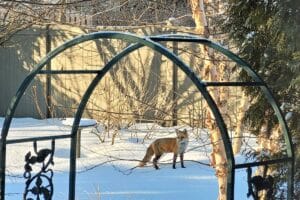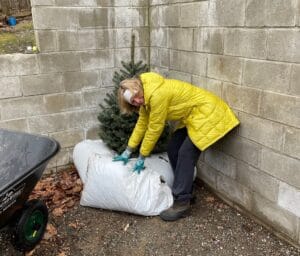Hello fellow readers, After a week’s transition in the garage to re-acclimate our ‘Baby Blue Eyes’ Spruce to the outside world, Ellie’s memorial Christmas tree now sits in a protected spot. She’s in front of the future vegetable garden where the rundown horse barn once stood. Yesterday while looking upon the future garden spot, two red foxes came passing through.
Foxes help keep pesky rodents out of your garden.
It’s mating season, likely why the two were frolicking together. One saw me and stood steadfast, staring at me, watching through the kitchen window. Foxes have keen eyesight.
Some think foxes are mischievous critters, not liked by those who raise chickens or have guinea hens to feed on deer ticks and slugs.
While foxes may pilfer from gardens or dig up turf seeking out grubs, they are masterful hunters of mice, moles, voles, and other small mammals like squirrels and rabbits that damage gardens. Plus, they eat crickets, caterpillars, and beetles; some are beneficial bugs, it’s true. Still, I think of foxes as favorable even though they feed on fruits, berries, potatoes, other tubers, and grasses too.
Ways to keep foxes from pilfering from your garden:
There are deterrents such as coyote urine or human urine if you’re so inclined. Then there’s hot pepper sauce or commercially available bad-tasting sprays.
We’ll install attractive fencing around the vegetable garden adding welded wire mesh to the bottom two feet burying twelve inches below the surface and bending another foot into an L-shape extending outward. Adding a 20-inch forty-five-degree overhang on top of the fence will prevent climbers or jumpers such as fox.
Then there are electrical fences to consider. As it turns out, devices that shine lights or squirt water can be helpful, which brings a memory of a few years back hearing chilling screeching that went on and on in the wee hours one winter’s night.
What a ruckus!
“Hurry up and finish it off,” I said under my breath, saddened by the cruelty of the predator.
Curt ventured out in the foot of snow, flashlight in hand, to investigate. Under the American flag garden were two young red foxes playing chase. What a ruckus!
“You two,” Curt yelled, pointing the flashlight into their eyes, “go home.” They stopped dead in their tracks and stared much like puppies being reprimanded. Then off they ran, returning the night to silence.
 Fox Folklore & The Little Prince
Fox Folklore & The Little Prince
Many Native Americans consider them a kindhearted spirit associated with wisdom, depending on the tribe. Others believe the clever fox stole fire from the gods to bring to humankind.
In some Asian cultures, the fox represents good fortune. Others think they communicate with ancestors bringing messages to their loved ones on earth.
This brings me to The Little Prince’s story, written in 1943 by Antoine de Saint-Exupéry. The children’s story teaches life lessons that many adults could benefit from.
A little prince nurtures and adores a single rose until he comes across rows of roses in one of his adventures. He felt foolish for thinking he had a special relationship with his perfect rose. She’s just one of many.
He comes upon a fox with whom he wants to become friends and play. But the fox says he is not tame. The prince didn’t know what that meant.
“It means to establish ties,” said the fox. “To me, you are still nothing more than a little boy who is just like a hundred thousand other little boys. And I have no need of you. And you, on your part, have no need of me.” He goes on to say, “But if you tame me, then we shall need each other.”
You can only see valuable things with your heart.
The little prince learns that his rose is indeed more cherished than all the other roses in the row because he nurtured and loved her– Just as we need to nourish and cherish our dear earth and each other in this garden of life.
Garden Dilemmas? AskMaryStone@gmail.com (and now on your favorite Podcast App.)
You’ll enjoy a previous column, The Beauty and Beast of Roses.
About Ellie’s Living Christmas Tree.
More about The Little Prince
Foxes in the Garden is a feature in Episode 24 of the Garden Dilemmas Podcast (link below)





